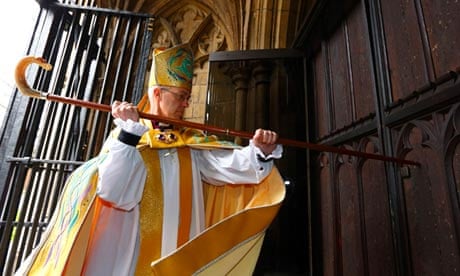Justin Portal Welby's long and unlikely journey from young oil executive to leader of the world's 77 million Anglicans ended with three slow and echoing taps on the west door of Canterbury Cathedral on Thursday afternoon.
The knocking of his pastoral staff was answered with a fanfare – and a self-inflicted inquisition.
"We greet you in the name of Christ," said Evangeline Kanagasooriam, a 17-year-old Anglican chosen to hail the new archbishop by putting to him a list of questions he himself had penned for the occasion. "Who are you and why do you request entry?"
The archbishop replied: "I am Justin, a servant of Jesus Christ, and I come as one seeking the grace of God, to travel with you in this service together."
Before a congregation of 2,000 people, among them the Prince of Wales, the Duchess of Cornwall, the prime minister and representatives of all the world's major religions, the 105th Archbishop of Canterbury explained, slowly and humbly, that he had come to proclaim the love of Christ, to worship him and to love him.
"I come knowing nothing except Jesus Christ and him crucified, and in weakness and fear and much in trembling," he added.
But if he was shaking inwardly at either the thought of his new responsibilities or the knowledge that the date of his enthronement coincided with the anniversaries of the deaths of both St Benedict and Thomas Cranmer, he gave no outward sign.
He followed a magnificent – if at times halting – procession of clerics from the Assyrian church of the East, the Oriental Orthodox churches, the Orthodox churches and the Roman Catholic church clad in purple, scarlet, black and white. But Welby seemed at ease in his green and gold robes and his new office.
After bowing his head to listen to Psalm 80, he smiled at the congregation as he made his way towards the cathedral altar.
The enthronement ceremony itself was as eclectic and international as the guest list.
For the first time in the church's history, the new archbishop was installed on his diocesan throne by a woman, the Venerable Sheila Watson, archdeacon of Canterbury.
Although the role falls to the archdeacon regardless of gender, the precedent will delight those Anglicans who, like Welby, remain in favour of the introduction of women bishops despite the General Synod's no-vote on the issue last November.
Once the new archbishop had been installed on the marble chair of St Augustine, signalling his appointment as head of the Church of England and also representing his inauguration as spiritual leader of the global Anglican communion, C of E tradition gave way to a more personal and international celebration.
The inclusion of a Punjabi hymn, however, may have been a step too far for some of the worshippers.
Confronted with the overwhelming otherness of its refrain of saranam, saranam, saranam – meaning my refuge – the congregation treated it as if it were an overly spiced dish: they picked at it gingerly, politely and, above all, Englishly.
"Appropriating other people's liturgies," whispered one wry cleric, "does bring certain difficulties."
But the Punjabi melody was as nothing in comparison with the African dancers, whose booming drums, chanting and energetic dancing elicited a grin from the archbishop – a reminder, perhaps, of his time as a peace negotiator in the continent.
Gleefully aware of the disconnect between the sober surroundings and the vitality of the dancers, he kicked off his sermon with a joke. "It's got a good reverberation, this cathedral," he noted, to much laughter.
The rest of the sermon, though, was deliberately short on gags. As befitted the leader of the C of E, Welby insisted on the primacy of his church's position in the nation's past and its future – and its absolute right to have its say in an increasingly secular society.
"For more than 1,000 years this country has to one degree or another sought to recognise that Jesus is the son of God; by the ordering of its society, by its laws, by its sense of community," he said.
"Sometimes we have done better, sometimes worse. When we do better we make space for our own courage to be liberated, for God to act among us and for human beings to flourish.
"Slaves were freed, Factory Acts passed and the NHS and social care established through Christ-liberated courage."
It was only through such courage, he added, that the economic, environmental and developmental challenges of the age could be faced.
Repeated compound adjectives – "a Christ-heeding life" and a "Christ-heeding church" – were deployed, as was the peculiar blend of missionary zeal and corporate speak that one might expect from a man with the archbishop's unique CV and evangelical links with Holy Trinity, Brompton.
"Today we may properly differ on the degrees of state and private responsibility in a healthy society," he said.
"But if we sever our roots in Christ we abandon the stability which enables good decision-making. There can be no final justice or security or love or hope in our society if it is not finally based on rootedness in Christ."
After the creed and some Benjamin Britten, and a blessing and a long round of applause, the man charged with holding together the fractious global Anglican communion as it struggles with the vexed issues of women bishops and same-sex marriage processed out of the cathedral and into the bitterly cold spring afternoon.

Comments (…)
Sign in or create your Guardian account to join the discussion